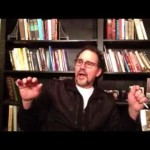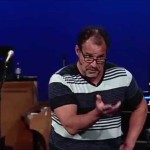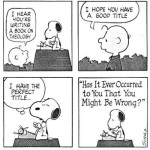We run our website the way we wished the whole internet worked: we provide high quality original content with no ads. We are funded solely by your direct support. Please consider supporting this project.

Divine Drama
Jeff K. Clark posted last week on God as Master Story-Teller and Finding Our Place Within the Divine Drama. There’s an enormous difference between talking about God using abstractions versus locating him in the stories he has chosen to inhabit. God comes to us not only in the history of his interactions with his people, but in our day-to-day stories as God breaks in to make himself known. How will your life become God-talk to the world around you?
From the post:
Church becomes a place of stories and story telling, and truth is conveyed not as general ideas, but living realities. Here God-talk shifts from discussing abstract theories related to the Divine and into real-life drama that sees God as the One who is intimately involved in the story. God’s story becomes our story and our role is to tell our story within God’s story. Meaningless, unstoried God-talk is replaced with meaningful, storied God-talk and life is finally fused into the drama where God is the Master storyteller and we as actors in the play of the ages.
Find your place. Take a seat. Tell your story.
Image by pedro veneroso. Sourced via Flickr.
Category: General
Tags: Christian Living, Theology
Related Reading

How can prayer change God’s mind?
You’ve argued that since God is all-good, he’s always doing the most he can do in every situation to bring about good. But you have also argued that prayer can change God’s mind. How are these two beliefs compatible?

Hearing and Responding to God: Part 4
Are you inadvertently appealing to magic when you listen for God’s voice? Greg continues his series on hearing and responding to God by pointing out the difference between communion with God and Christian magic. You can view the previous videos here and here and here.

The Evangelical Heart
qthomasbower via Compfight Rachel Held Evans posted recently about The Scandal of the Evangelical Heart. Citing a comment by John Piper (“It’s right for God to slaughter women and children anytime he pleases. God gives life and he takes life. Everybody who dies, dies because God wills that they die.”) she notes that when we approach the Bible in…

SERMON CLIP: Hell in a Nutshell
Is hell for real? Is it what we have been told it is? Does an all-loving God really torture people there forever? These are a few of the questions that Greg Boyd touches on in this weeks sermon clip. In the full sermon, Greg explores the fallacy of relativism, the singular truth of Jesus as…

Is Islam Inherently Violent? – Further Thoughts
Greg originally posted some thoughts on Islam here. In this video, he discusses some responses he received, and further thoughts on a Kingdom posture toward Muslims.

Lighten Up: Theology
I stole this from a reader’s Facebook page. (Thanks Kevin.) It’s good to remember that we don’t really have it all figured out.
